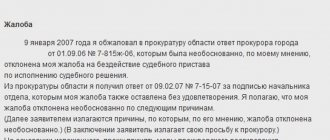The procedure for familiarizing a suspect with the materials of a pre-investigation check
The criminal procedure law does not contain a direct indication of the procedure for familiarizing a suspect with the materials of a pre-investigation check. But from the analysis of its legal norms, it is possible to determine the procedure for familiarization based on the stages of the audit:
- Familiarization before the final decision is made on the inspection material.
- Familiarization after the final decisions are made: on the refusal to initiate or initiate a criminal case.
In the first case, when the verification period has not yet ended, the potential suspect can partially become familiar with the content of the investigative actions in which he took part during the verification process.
However, practice shows that the client does not have copies of the protocols of investigative actions, for which he signs in the appropriate column. Meanwhile, knowledge of their exact content is important not only from the point of view of analyzing information on the case, but also from the point of view of assessing the legality of the audit. Therefore, in most cases, a lawyer is responsible for obtaining these copies, exercising his right to familiarize himself with these materials.
But investigative actions are not always carried out with the participation of a potential suspect, and the only source of information is sometimes only a detailed clarification of all the circumstances from the defendant himself. Therefore, until the end of the inspection, it may be impossible to even partially become familiar with its contents.
In the second case, when, based on the materials of the pre-investigation check, a decision is made to initiate a criminal case against a specific person, the right arises to receive a copy of the decision. In principle, based on the text of the resolution, it is already clear what is at stake and approximately what materials are available to the investigation.
However, these materials should be studied. How to do it? For example, by appealing the decision to initiate a criminal case in court in accordance with Article 125 of the Code of Criminal Procedure of the Russian Federation.
In support of the reasons and grounds for initiating a criminal case, the investigation must submit relevant material to the court. In court, at the written request of the suspect or his defense attorney, these materials are provided for review with the possibility of making photocopies of them.
However, based on the inspection materials, a decision may be made to refuse to initiate a criminal case, which raises the question of the advisability of familiarizing yourself with these materials, which is resolved differently in each case.
The fact is that this resolution can be canceled by a higher investigative authority or a court based on a complaint from the victim. In case of cancellation, the lawyer taking part in the pre-investigation check will have copies of materials, the analysis of which will help determine a more accurate line of proving the citizen’s innocence.
Everything about criminal cases
— does the citizen who was subject to an inspection have the right to familiarize himself with the materials of the pre-investigation inspection?There is no such right in the Code of Criminal Procedure
Url Additional information:
- clause 1 part 4 46 Code of Criminal Procedure
the suspect has the right to receive documents
- it should be understood that the status of a suspect
he does not have and therefore does not have the right to familiarize himself with the documents provided for in
paragraph 1, part 4, 46 of the Code of Criminal Procedure
.
- in the norms of Part 2 145 of the Code of Criminal Procedure
and
Part 4 148 of the Code of Criminal Procedure
provides for the obligation of officials to notify only the applicant about the results of the inspection.
— at the same time, these standards do not mention the person in respect of whom the check was carried out.
In fact, there is a right to familiarization
Url Additional information:
— Part 2 24
Constitution of the right of citizens to familiarize themselves with materials
— Part 2 Article 5
N 59-FZ the right of a citizen to get acquainted with inspection materials
- but this does not mean that this person does not have the right to access the materials. Although there are no direct rules of criminal procedure law providing for such a right, there are general rules:
Part 2 24
Constitution of the right of citizens to familiarize themselves with materials
Part 2 Article 5
N 59-FZ the right of a citizen to familiarize himself with inspection materials.
— Determination of the Constitutional Court of the Russian Federation
dated September 29, 2011 N 1251-О-О when considering the complaint of gr. A.A. Navalny. The body of inquiry refused to allow this citizen to familiarize himself with the materials of the verification of his statement of crime, which ended with the issuance of a decision to refuse to initiate a criminal case. By the decision of the district court, upheld by the ruling of the second instance court, the refusal was recognized as legal. But the Constitutional Court did not agree with this position and actually recognized the right of any person (not just the applicant) to familiarize themselves with the materials of the pre-investigation check.
Determination of the Constitutional Court of the Russian Federation dated September 29, 2011 N 1251-О-О
“ Part 2 of 24
of the Constitution obliges officials to provide everyone with the opportunity to familiarize themselves with documents and materials that directly affect their rights and freedoms, unless otherwise provided by law.
Due to the direct effect of this constitutional norm, any information, with the exception of: - information containing state secrets,
- information about private life,
— as well as confidential information related to official, commercial, professional and inventive activities,
must be available to a citizen if the collected documents and materials affect his rights and freedoms.....
This legal position... is fully applicable to situations related to ensuring access of persons whose rights and freedoms are affected by the decision to refuse to initiate criminal proceedings to the materials on the basis of which this decision was made.
Since restrictions on the right of citizens to access information can only be established by law, and Part 2 145 of the Code of Criminal Procedure and Part 4 of 148 Code of Criminal Procedure do not contain any indication of such restrictions in relation to persons whose rights and freedoms are affected by the decision to refuse to initiate criminal proceedings cases, their application must be carried out in accordance with the stated legal position......
.»
Grounds for refusing a suspect to familiarize himself with the materials of a pre-investigation check
The only basis for refusal, in my opinion, may be the issuance of a decision to initiate a criminal case not against a specific person, but based on the fact of a crime, for example, theft from a store. In this case, for the time being, the verification itself does not concern the citizen, since the investigation is not yet sure of his involvement in the commission of the crime.
At the same time, there are situations when a case is initiated after the fact, and all verification activities are carried out in relation to a specific citizen. Here the situation is more complicated. On the one hand, his rights are directly affected by such actions of the investigation, on the other hand, his status has not yet been officially determined. Therefore, it is necessary to provide additional arguments in a request to familiarize yourself with the inspection materials, with which a criminal lawyer can help.
Thus, familiarizing the suspect with the materials of the pre-investigation check makes it possible to:
- thorough preparation for defense;
- appealing the decision to initiate a criminal case;
- the investigators are still convinced at the verification stage of non-involvement in the committed or suspected crime.
Therefore, at this stage of the criminal process, from the point of view of the defense, it is already necessary to do everything possible to prove one’s innocence.
The suspect’s right to familiarize himself with the protocols of investigative actions
Lawyer Antonov A.P.
The suspect has the right to “get acquainted with the protocols of investigative actions carried out with his participation and submit comments on them.” In this case, the form and procedure for familiarization with the necessary materials are chosen by the investigator (interrogating officer, etc.) within the limits that preclude the disclosure of investigative secrets. Despite the fact that any participant in an investigative action has this right, the legislator considered it necessary to devote a separate paragraph of Art. to it. 46 of the Code of Criminal Procedure of the Russian Federation. Let's try to explain its content.
The suspect has the right to familiarize himself with the protocols of investigative actions. To get acquainted means to receive, collect information about something, examine, read, observe in order to get an idea, information about something.
In other words, the right of a suspect to get acquainted with a certain kind of protocol of an investigative action presupposes the obligation of the investigator (interrogating officer, etc.), after drawing up such a protocol of investigative action, to provide the suspect with the opportunity to at least inspect and read both the entire protocol as a whole and all the elements of it components. The suspect has the right to familiarize himself not only with the written part of the investigative protocol, but also with all the appendices to it. Therefore, if the photo table attached to the investigative action protocol was compiled some time after the suspect familiarized himself with the written part of the investigative action protocol, the suspect has the right to demand that the investigator (interrogating officer, etc.) subsequently familiarize him with the contents of this photo table.
In this regard, it is important to clarify what it is - a protocol of investigative action? The protocol of an investigative action here refers to the type of source of evidence of the same name. A protocol of an investigative action is a written procedural act and its annexes duly drawn up at the stage of preliminary investigation, which contain information about the fact of production, the progress and results of the investigative action, the facts and circumstances sensibly perceived by the investigator (inquirer, etc.) during the execution of this action .
The criteria for investigative protocols are as follows:
1) the contents of the protocol of investigative action - information related to the criminal case always appears (obtained) within the framework of the criminal process;
2) only the subjects carrying out the criminal process can record this information: the investigator (inquiry officer, etc.).
Part of the protocol (an appendix to it) may be phonograms, photo tables, films, video tapes, drawings, plans, diagrams, electronic storage media, etc., recorded or produced during its production. The suspect becomes familiar with the investigative protocol as a whole. If he took part in the investigative action, then his comments, first of all, should be reflected not in the appendices to the written part of the protocol, but on the written medium itself. When, during the production of a procedural action, technical means were used that are capable of recording oral statements and (or) comments, and such took place, it is recommended that these statements also be reflected on the corresponding applications (media of audio, video information, etc.) and/or comments.
Now a few words about what was used twice in Part 4 of Art. 46 of the Code of Criminal Procedure of the Russian Federation for the concept of “investigative action”. An investigative action in this article refers to a criminal procedural action (body movement) of a preliminary investigation body, which is one of the main means of establishing circumstances that are relevant to the case and characterized by a detailed independent production procedure.
The system of these basic means of establishing circumstances relevant to the investigation, consideration and (or) resolution of a criminal case (investigative actions) includes:
1) inspection (Articles 176 - 178, 180 of the Code of Criminal Procedure of the Russian Federation);
2) exhumation (Articles 178, 180 of the Code of Criminal Procedure of the Russian Federation);
3) examination (Articles 179, 180 of the Code of Criminal Procedure of the Russian Federation);
4) investigative experiment (Article 181 of the Code of Criminal Procedure of the Russian Federation);
5) search (Articles 182, 184 of the Code of Criminal Procedure of the Russian Federation);
6) seizure (Article 183 of the Code of Criminal Procedure of the Russian Federation);
7) seizure of postal and telegraph items, their inspection and seizure (Article 185 of the Code of Criminal Procedure of the Russian Federation);
 control and recording of negotiations (Article 186 of the Code of Criminal Procedure of the Russian Federation);
control and recording of negotiations (Article 186 of the Code of Criminal Procedure of the Russian Federation);
9) obtaining information about connections between subscribers and (or) subscriber devices (Article 186.1 of the Code of Criminal Procedure of the Russian Federation);
10) interrogation of a witness, victim (Articles 187 - 191 of the Code of Criminal Procedure of the Russian Federation), suspect (Part 4 of Article 92 of the Code of Criminal Procedure of the Russian Federation), accused (Articles 173, 174 of the Code of Criminal Procedure of the Russian Federation), expert (Article 205 of the Code of Criminal Procedure of the Russian Federation ) and (or) a specialist (part 4 of article 80 of the Code of Criminal Procedure of the Russian Federation);
11) confrontation (Article 192 of the Code of Criminal Procedure of the Russian Federation);
12) presentation for identification (Article 193 of the Code of Criminal Procedure of the Russian Federation);
13) checking the testimony on the spot (Article 194 of the Code of Criminal Procedure of the Russian Federation);
14) conducting a forensic examination (Articles 195 - 201, 203, 204, 207 of the Code of Criminal Procedure of the Russian Federation);
15) obtaining samples for comparative research (Article 202 of the Code of Criminal Procedure of the Russian Federation);
16) seizure of property (Article 115 of the Code of Criminal Procedure of the Russian Federation).
The suspect has the right to familiarize himself with the protocol of any of the listed investigative actions if he took part in it. The only exception to this rule is the conduct of a forensic examination, as a result of which a protocol of investigative action is not drawn up. Therefore, the suspect is not able to get acquainted with such a person, although he is quite capable of participating in the forensic examination with the permission of the investigator (interrogating officer, etc.).
In clause 8, part 4, art. 46 of the Code of Criminal Procedure of the Russian Federation refers to the performance of investigative actions “with his” participation. “With his participation” means with the participation of the suspect. Accordingly, this right cannot be extended to cases where it was not the suspect himself who took part in the investigative action, but, for example, his legal representative and (or) defense attorney.
In the legal literature, an opinion has been expressed that the suspect also gets acquainted with the materials of the preliminary investigation bodies “when the court verifies the legality and validity of the suspect’s detention.” The decision on detention is made by the court. It is in accordance with Part 11 of Art. 108 of the Code of Criminal Procedure of the Russian Federation can be verified in the appellate instance. In this case, the suspect, if he has such a right, should have the opportunity to familiarize himself with all the materials available to the appellate court, and not just those presented by the preliminary investigation authorities.
Sincerely, lawyer Anatoly Antonov, managing partner of the law firm Antonov and Partners.
Still have questions for your lawyer?
Ask them right now here, or call us by phone in Moscow +7 (499) 288-34-32 or in Samara +7 (846) 212-99-71 (24 hours a day), or come to our office for a consultation (by pre-registration)!
A comment
Protocol under Art.
217 of the Code of Criminal Procedure of the Russian Federation is drawn up after the sheets of the case have been read by all participants in the process, in particular, this may be the defendant, the victim. When there are several persons involved in the materials, the investigative body has the obligation to present the materials to each of them, as well as to their defenders. In addition, it should be noted that if there are a large number of volumes, a schedule is maintained for familiarization with the materials of the criminal case. This act reflects on what day the participant in the process was familiarized with a certain number of pages. The document in question is not binding and is of a technical nature. The Supreme Court stipulates that, regardless of the moment of merging criminal cases into one, all perpetrators must be familiar with the materials of the combined case. The announcement of petitions and statements after reading the materials can be expressed both orally and in writing. When the first option is chosen, this is reflected in the protocols; in the latter case, the document must be included in the case file. Constitutional provisions must be respected when performing the action in question, for example, when the defense needs time to formulate a statement, the investigation provides it.
A person who has committed a serious or especially serious crime should be explained that he has the right to request that the case be considered by one judge or in a collegial manner. In this case, the materials are reviewed by three judges. This provision has implications for the first instance.
If the case is heard by a mid-level court (this applies to a court of general jurisdiction), then it is necessary to explain to the accused:
- the opportunity to file a petition regarding the consideration of materials with the participation of a jury trial;
- when the term of punishment for the committed action does not exceed 10 years - this is the basis for an application for consideration of the case in an abbreviated manner, this indicates a verdict without trial in court;
- in all categories of cases, the perpetrator has the opportunity to apply for a court hearing with preliminary hearings;
R
The implementation of these rights is not always correctly understood in practice. In particular, the problem is solved by the Supreme Court, which indicates that the familiarization can be completed by drawing up a protocol, which reflects that the listed provisions have been explained to the perpetrator.
The legislation of the Russian Federation provides for the possibility of terminating the investigation without full familiarization of the defense with the case materials. This refers to a situation where the perpetrator and his defense attorney deliberately delay their acquaintance. In addition, it is possible to conduct familiarization separately. It is the responsibility of the lawyer to explain such rights.
Basic provisions
Familiarization with the materials of a criminal case under the Code of Criminal Procedure of the Russian Federation is carried out after passing through all stages of the investigation, which are provided for by law. All materials, as well as material evidence, etc., are provided for reading. The defense may file a motion to review photographs and video materials.
When it is not possible for one reason or another to satisfy the specified request, the person conducting the preliminary investigation makes a decision. The procedure for familiarizing yourself with these materials of the criminal case may be separate. The defense side gets acquainted at different times. This provision can be implemented if there is a statement written by the lawyer and the accused. The form is provided by the investigator.
The bodies of inquiry and investigation (when applying the general procedure) cannot limit a person in the time it takes to read all the materials. The Code indicates that it is possible to limit the period under consideration if a situation arises that indicates deliberate delay on the part of the perpetrator. The decision is made by the judge. If the court comes to the conclusion that the defense intends to delay the acquaintance, a certain period is established during which the defense must read the materials.
If the acquaintance process is not completed within the established time period, the investigative body adopts a resolution providing for the completion of the proceedings. After which you can submit the document for judicial review.
If there are several persons in the case who are accused of a crime, they will be examined in the order established by the person conducting the investigation.
When studying the materials contained in the case, the defense may be able to go back to any of them and read them again. In addition, it is allowed to write out various types of information and copy sheets. When data is stored that constitutes a secret protected by the state, it is necessary to familiarize the culprit and the defense attorney at a court hearing. Current legislation provides that at the end of the meeting, the investigator needs to find out what objections, comments, and wishes there are. It is necessary to find out which participants in the case the defense wants to call to court.
It can be:
- experts;
- witnesses;
- consultants;
- other persons.
Upon completion of the review, a procedural document is drawn up in the prescribed form.
How to properly submit a petition to the investigative committee?
Please, we need a sample petition for familiarization with the verification material to the investigative committee. Back in July, I wrote a statement to the prosecutor’s office to initiate a criminal case for falsification of documents in court against citizen Kh. The prosecutor’s office sent it to the inquiry, they dug up something and handed it over to department at the beginning of September to the next committee. They called me in and interviewed me, and there was silence. I know for sure, I saw for myself that there was already enough evidence in the case. Investigator Baigulov came several times. Who is conducting the material, he is either away or busy. A month ago said that the case was being examined in Kazan, I said that I intended to get acquainted, I replied that only after the decision had been made. Believe me, I have reason to believe that they want to hush up the case, since people “not the last” are involved as defendants. In addition I also know that citizen X is on very friendly terms with the deputy head of the next com.






